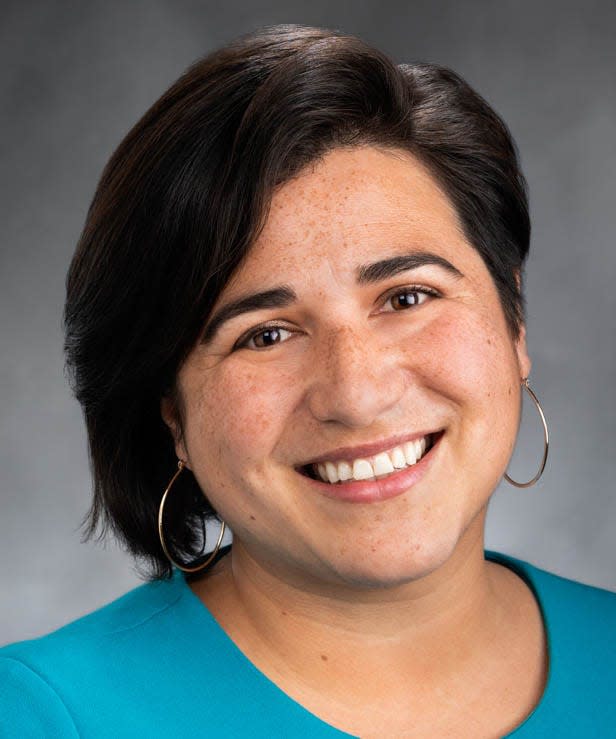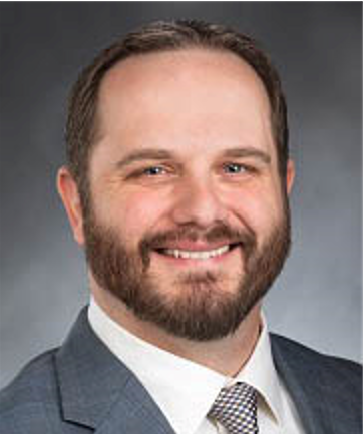Election 2022: Candidates for 26th District state Senate

- Oops!Something went wrong.Please try again later.
State Sen. Emily Randall is facing a first-term challenge by Republican state Rep. Jesse Young, who has represented the 26th District in the House since 2014.
The Kitsap Sun asked the legislative candidates to answer seven questions. Crissman did not respond to the Kitsap Sun's request. The answers of Randall and Young follow:
Emily Randall
Age: 36
Current occupation: State Senator, 26th District (Former non-profit fundraiser, healthcare and education advocate)
Previous elected experience: Elected in 2018 to the Washington State Senate
Party: Democratic
Campaign contributions: $566,081.69 (as of Sept. 26)

Q: Inflation is a challenge for many. What should the Legislature do to help those struggling with the rising cost of gas and food?
A: We need to address the cost of living in our community and state, to ensure people and businesses here can afford to stay here. I’ll continue to work to lower costs of the daily expenses that we depend on — housing, healthcare and transportation, for example.
We need to do more to ensure we’re increasing the supply of housing, to lower costs for all renters and homeowners. I’ve led efforts to lower the cost of life-saving prescription drugs, like insulin—but we can and should do more to expand access to affordable healthcare. And we need to make sure people can get around our community efficiently and affordably. That’s why I worked to lower tolls on the Tacoma Narrows Bridge. I would also be supportive of a gas tax holiday, but only along with safeguards to ensure relief is seen at the pumps for folks rather than expanding profits for oil companies.
Q: Police reform legislation raised the barrier for law enforcement to engage in vehicle chases of those suspected of a crime. Do you support the legislation as is, or do you think it should be changed?
A: In 2021, responding to calls for action in Kitsap and across the country, Washington passed nation-leading police reform. Further conversations with local law enforcement and neighbors showed me that we needed to strike a better balance between police accountability and public safety. I’m proud to have worked with Sheriff Gese and colleagues to pass important policy fixes so that our brave first responders can best serve our community.
We weren’t able to get the fix to vehicle pursuits across the finish line this year. While I certainly supported the effort to keep high speed chases off neighborhood streets where children play, I also recognize that in a largely rural county like ours, law enforcement can’t pursue by traffic camera as some Seattle-area legislators recommended. I’m supportive of efforts to rework our pursuit policy to balance the need for safety and for law enforcement to be most effective at their jobs.
Q: Should the Legislature make drug possession a felony, as it was before the state Supreme Court found Washington’s law on simple possession unconstitutional?
A: I believe that we should address substance abuse disorder like the public health emergency it is, which cannot be done through harsh criminal penalties alone. At the same time, we must protect our communities from the negative effects of drug-use and provide incentives for people to seek treatment. We should not make possession of personal amounts of drugs a felony, but ensure that we are working with local law enforcement, prosecutors, and substance use disorder treatment professionals to find the right balance to respond to our communities needs. Possession of amounts above personal use should be a felony, but we should prioritize solutions that are proactive rather than reactive, and get people help before they end up in the criminal legal system.
Q: Should access to abortion be included in the Washington State Constitution?
A: Absolutely. Women’s reproductive rights and medical privacy should be constitutionally protected. We should trust people to make the right decisions for themselves about the future of their families, without the interference of politicians in their personal lives. I’m proud that the people of Washington voted to codify the reproductive privacy act in the 1990s and will continue my work to ensure everyone in Washington has access to essential healthcare.
Q: Washington state has struggled to provide beds for psychiatric patients, especially youth, and Western State has a waiting list of patients from the criminal court system. What can be done to ensure access to mental health care?
A: Our neighbors, family, and friends are struggling to access the mental health care they need. People are in crisis every day and treatment options are so limited. My family has experienced it too.
After decades of underfunding, I’m proud of the work we’ve done over the last few years – expanding teletherapy, beginning building a behavioral health teaching hospital to train more providers and open more beds, securing capital funding for Kitsap Mental Health to remodel and reopen their Youth Inpatient Unit. But we have more work to do.
I’m inspired by work in other states – like Arizona – where crisis care is available for all who need it. Meanwhile, evaluation & treatment facilities in Washington State are rejecting patients for co-occurring health care issues. We can and we must do better, and I’m committed to working across the aisle to find solutions.
Q: What can the Legislature do to address rising homelessness in Washington’s cities?
A: We are in a housing crisis across the state. Young working families are struggling to find apartments they can afford, so many of us face steep annual rent increases, retirees hoping to downsize can’t find something smaller in their budget, too many sleep on the street or in the woods.
Each person’s situation is different and there’s no one quick answer to this crisis. We need a multitude of solutions at all levels.
We need to incentivize the construction of housing and density in our urban centers, continue to increase emergency shelter beds and permanent supportive housing options like Pendleton Place, expand our first-time homebuyer down payment assistance programs and community housing trusts, and tackle skyrocketing rents. We also need to grow the number of living wage jobs in our community, and build pathways to those jobs for our neighbors who are struggling.
Q: What can the Legislature do to help ferry service to ferry-dependent communities become reliable again?
A: There’s nothing like being on a ferry in the middle of the Sound. A whale (or a submarine) surfaced beside you. But our ferry system isn’t just a novelty – our ferries are our marine highways, essential to our families and economy.
Neighbors who rely on the ferry system know that it’s been struggling. We haven’t built new vessels fast enough, and, along with the national maritime industry, we’ve faced record retirements and been challenged to recruit and train new staff quickly.
That’s why this year I was proud to work to pass Move Ahead Washington, a once-in-a-generation transportation infrastructure package that invested more in our ferry system than any package before it. We dedicated long-overdue funding to new vessel construction, hybridization and maintenance – and also significant dollars toward operations and staffing.
These investments will help ensure our ferry system is resilient and prepared for ongoing maintenance, infrastructure and staffing needs.
Jessie Young
Age: 45
Current occupation: Jesse maintains a software engineering company providing technology consulting services in the areas of Healthcare and Finance.
Previous elected experience: Unanimously and bi-partisanly appointed State Representative for the 26th Legislative District in 2014 and reelected to that same office four times.
Party: Republican
Campaign contributions: $517,394.54 (as of Sept. 26)

Q: Inflation is a challenge for many. What should the Legislature do to help those struggling with the rising cost of gas and food?
A: State spending has nearly doubled since Inslee took office, yet the effect of public services has remained static and problems like drugs, mental health, and our housing shortage are only getting worse. Ineffective and wasteful, this reckless spending is contributing to inflation. Then, when you add the massive gas, income, and property taxes that my opponent voted into law, it’s like getting sucker punched by someone you thought was a friend while our prices continue to rise out of control.
We must immediately reverse the tax increases that were voted in this session and then enforce spending reductions to agencies that are not improving their delivery of services despite the additional money we’ve given them.
Next, we must lower building industry regulation for the sake of addressing our housing crises and increasing good paying jobs.
Finally, we should seek to help fixed-income families by reducing our state’s property taxes.
Q: Police reform legislation raised the barrier for law enforcement to engage in vehicle chases of those suspected of a crime. Do you support the legislation as is, or do you think it should be changed?
A: The Democrat’s “Police reform” has been an unmitigated disaster for Washington! Crime skyrocketed and Senator Randall refused to listen to reason. She voted for every bill that stripped our police of the ability to pursue and detain criminals, and even stated callously that “Blue lives don’t exist” on her social media.
This legislation must be changed, and this year we attempted to do just that. Unfortunately, Senator Randall refused to support those efforts. She even went so far as to walk off the floor of the Senate and take an unexcused absence on the bill to restore police pursuit with just two days left in session. When we needed her most, she walked away, and you can see it here: https://tvw.org/video/senate-floor-debate-march-10-2022031192/?eventID=2022031192&startStreamAt=580
As our state senator, I will make the needed changes in law and stand up for our first responders. It’s why the major police unions have all endorsed my campaign.
Q: Should the Legislature make drug possession a felony, as it was before the state Supreme Court found Washington’s law on simple possession unconstitutional?
A: Hard drug possession should continue to be a felony. This is a major difference between my opponent and me. She has not only supported legalizing hard drugs, she has consistently voted for reducing sentencing on dealers and other criminals. On the other hand, I have sponsored the bill to correct the technicalities in law that the Supreme Court used to legalize drugs.
As a broader issue, it’s important to know that more than one trillion dollars have been spent, nationally, fighting illegal drugs with little to show for it. While drug possession is one small component of the whole picture, funds would be better utilized by focusing illegal-drug enforcement efforts on dealers and suppliers and stiffening penalties on those that target our children.
Q: Should access to abortion be included in the Washington State Constitution?
No.
Q: Washington state has struggled to provide beds for psychiatric patients, especially youth, and Western State has a waiting list of patients from the criminal court system. What can be done to ensure access to mental health care?
A: This is a crisis of immense proportion. Community-based treatment centers must be better funded if we are to serve the needs of the mentally ill.
The key is to require that money be diverted from agencies that are either not performing, not listening or being responsive to families, or that are just plain refusing to be transparent with the millions of dollars we are giving them. Instead, that money should be redirected to programs that are producing results.
I have consistently voted for funding in this area as your legislator in a bipartisan effort to address our mental health needs. It’s now time to demand accountability. We have a bureaucratic mess at the county-level with millions getting wasted. We should measure the results (which should include anonymous family feedback) and then adopt the policies of the best performers so that those who need the help actually get it.
Q: What can the Legislature do to address rising homelessness in Washington’s cities?
A: We must allow for the building industry to start building homes again. We can accomplish this with a three-pronged approach. First, we must allow for regional flexibility and county-level opt-outs from siting restrictions in the Growth Management Act (GMA). This will increase the availability of low-cost housing.
Second, we must support greater density options in already developed communities. Giving families and communities the option to allow for accessory dwelling units (ADUs), carriage homes, and other options will increase supply and allow for greater unit-size diversity, so families or individuals are more likely to find accommodations that fit them.
Finally, we must lower the massive layers of regulation that are adding thousands of dollars to the price of housing. When builders have to spend more time filling out paperwork than actually building homes, we exacerbate the problem in terms of time and money.
Q: What can the Legislature do to help ferry service to ferry-dependent communities become reliable again?
A: First, we must end the Governor’s state of emergency and rehire the hundreds of transportation workers he fired. Getting our staffing levels back up with qualified and experienced workers is priority number one. That is true for both reliability and safety.
Next, we must remove the mandate that creates a ferry-building-monopoly in this state by allowing out-of-state ferry construction. Our own state studies have conclusively shown that this will dramatically reduce ferry construction costs while having no negative impact on local construction jobs. We need multiple new ferries built, and there is plenty of work to go around, but not if we have to pay $200 - $400 million per ferry.
This article originally appeared on Kitsap Sun: Election 2022: Candidates for 26th District state Senate

